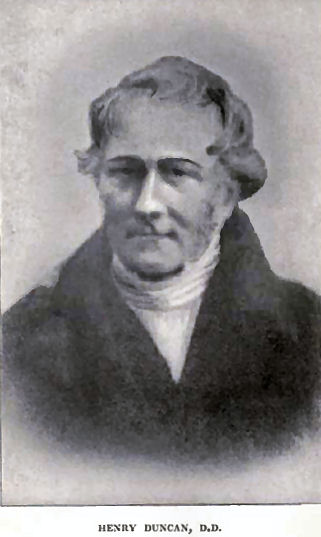|
"Even if we were to combine Pope's
Man of Ross and Goldsmith's Country
Clergyman into one, we would still have
to search for a third person, learned
and able in authorship, to complete a
parallel picture."
Article on Dr Duncan in
Chambers's "Eminent Scotsmen."
PREFACE

BEFORE allowing this small tribute to my
great-grandfather's memory to appear, I should like to express my
pleasure in being able to publish it through Messrs Oliphant, Anderson &
Ferrier of Edinburgh, who have been so long and so closely associated
with my family. More than a hundred years ago this firm published the
first of the many books entrusted to them by Dr Duncan. His life,
written by his son, the Rev. George John Duncan, was also issued by
them; and now, after a gap of one generation, this small sketch of mine
once more brings the same family into relations with this house. My
particular thanks are due to Mr Alexander Cargill, Manager of the
Edinburgh Savings Bank, for his interest in my great grandfather's
memory. Nearly two years ago I wrote to Mr Cargill to find out whether
there had been any memorial to commemorate Dr Duncan's work in
Edinburgh. In his courteous reply he said,
"I am sorry to say that there is neither stone nor
statue, or indeed a memorial of any kind, erected to his memory,
although I should have rejoiced, along with several others interested in
Savings Banks, to see in the capital city a memorial to such a great and
good man."
Himself an enthusiast on the subject of thrift, Mr
Cargill has spared neither pains nor trouble in connection with the
Centenary of Scottish Savings Banks, to be celebrated in Edinburgh this
year.
Dumfries, the county of Dr Duncan's adoption, is
rich in memorials of him. In the town the Savings Bank itself is
dedicated to his memory, and his statue is in front, holding a scroll.
This important building, as it now is, was once represented by a single
room in Chapel Street, Dumfrie; "the counter or telling table consisted
of two planks placed over a couple of barrels, lighted by dip candles."
In his own parish an obelisk marks the scene of his many labours. The
beautiful Runic cross he rescued from destruction stands in the parish
church.
Throughout his long and fruitful life, Dr Duncan
laboured to make the people thrifty and independent. His great
conception, the creation of Savings Banks, has proved a national
blessing. He wished for no recognition; he asked for no recompense. His
text was, "I must work the works of Him that sent me while it is day;
the night cometh when no man can work."
SOPHY HALL.
LONDON, January 1910.
Contents
Chapter I
Birth—Education—Ordination—Marriage—Ruthwell
Volunteers—Visit of the "Society of Friends".
Chapter II
Poor
Laws—First Literary Efforts—Publication of the "Dumfries Courier".
Chapter III
Savings Banks founded—Visit to London—Savings Bank Bill.
Chapter IV
Home Life—Visitors to Ruthwell Manse.
Chapter V
Correspondence with Brougham—Emancipation of Slaves—Catholic
Emancipation —Geological Discovery—Runic Cross.
Chapter VI
Death
of Mrs Duncan—Letters from Joanna Baillie—"The Sacred Philosophy of the
Seasons"—Poem on Curling.
Chapter VII
Second Marriage—Further
Correspondence with Brougham—Church Patronage— Disruption of the Church
of Scotland.
Chapter VIII
Leaving the Manse:—Building ok Free
Church—Death |

